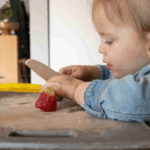
Respectful intimate care in nurseries
Find out about best practice surrounding intimate care routines and how to turn them into meaningful learning opportunities.
What are intimate care routines?
Intimate care routines are essential throughout the day to ensure that children’s basic needs are met. Intimate care routines include nappy changing, supporting children with using the toilet, feeding, changing clothes and administering first aid treatment as required.
What is good practice surrounding intimate care routines?
- Conduct thorough inductions for all new staff to ensure they are fully aware of all nursery policy and procedures relating to intimate care routines
- Ensure all staff undertaking intimate care have suitable, enhanced DBS checks
- Ensure children are afforded privacy during intimate care routines whilst balancing this with the need to safeguard children and staff
- Ensure all staff are respectful and sensitive when taking part in imitate care routines, e.g. encouraging staff to ask children’s permission before changing nappies (when developmentally appropriate)
- Encourage giving cuddles to children who need comforting, but support staff to try to do this in view of others, where possible
- Ensure all staff, volunteers and visitors are aware of the whistleblowing procedures
- Ensure staff have an up-to-date understanding of safeguarding and child protection, know how to protect children from harm and can identify signs and symptoms of abuse
Using intimate care routines as learning opportunities
Intimate care is a wonderful opportunity to share time with children and there is a wealth of learning that can take place to enhance their development.
Learning opportunities might include:
- Narrating what is happening as you do it so the child knows what to expect
- Singing a favourite song
- Telling a favourite story
- Pointing out and observing what is happening in the room
- Conversation (depending on the stage of the child) about their interests.
Whilst intimate routines are necessary for all children, they also offer practitioners a great opportunity to engage children in conversation. This can really help to support their social and emotional as well as their language and communication development.
Looking for more support with intimate care routines in nurseries?
See our ‘Exemplary practice with babies‘, ‘Exemplary practice with two-year-olds‘ and ‘SEND awareness‘ online courses.
Our ‘Terrific two-year-olds’ online course or face to face training will also be helpful.
We also have an adaptable ‘Respectful intimate care’ policy template for nurseries to use.
- PSED
- Safeguarding
Similar Articles
Top tips: Involving children in snack preparation

Early years activity: Fruit faces


